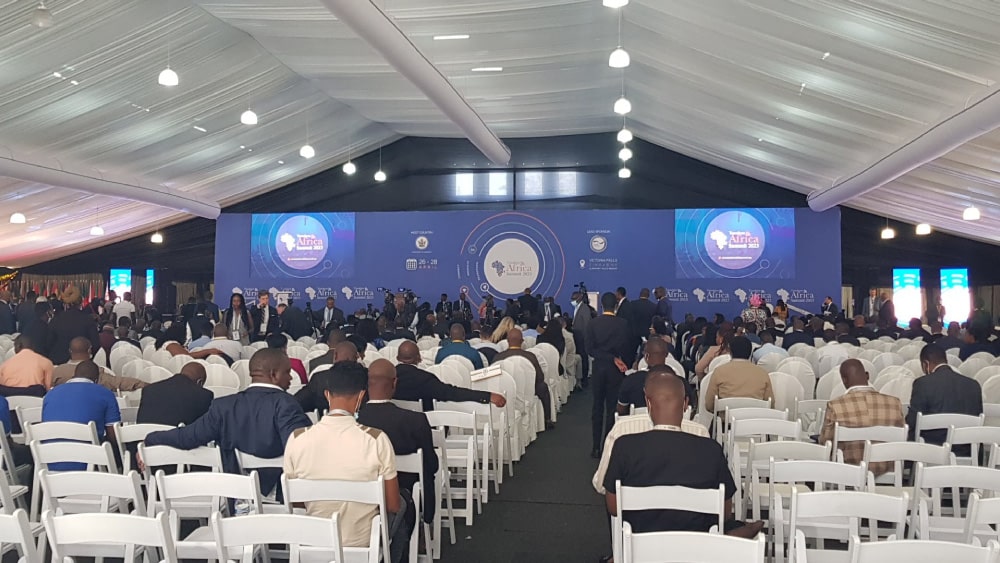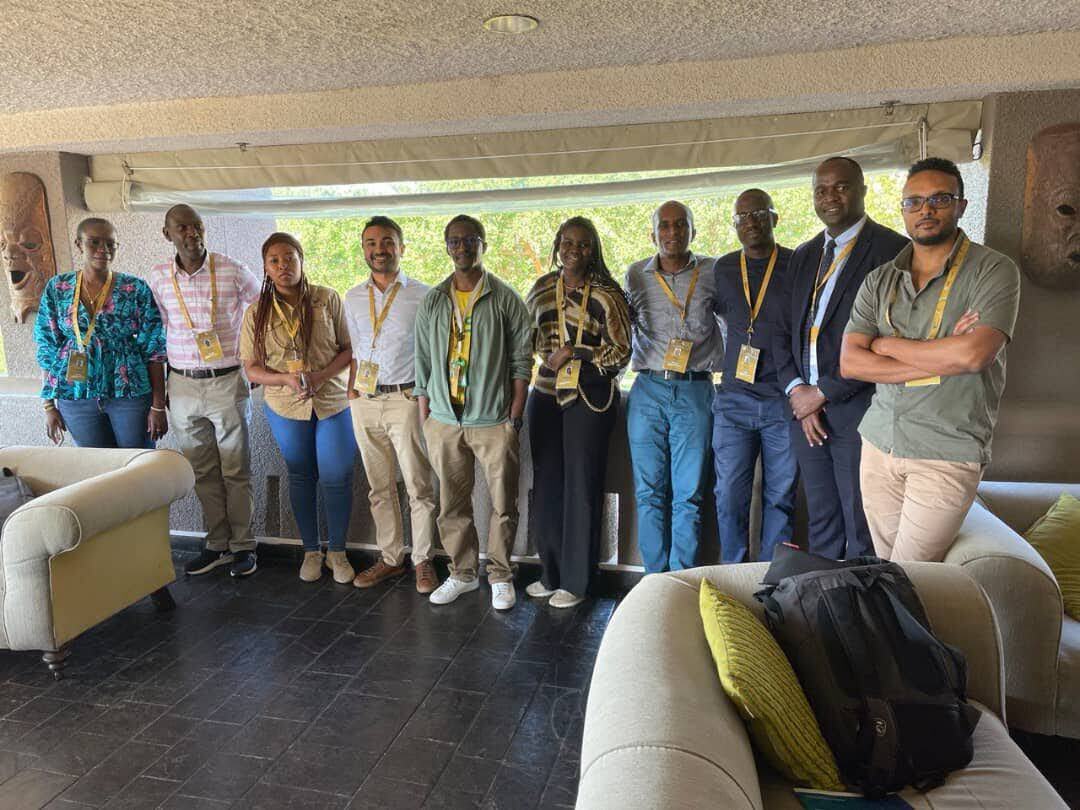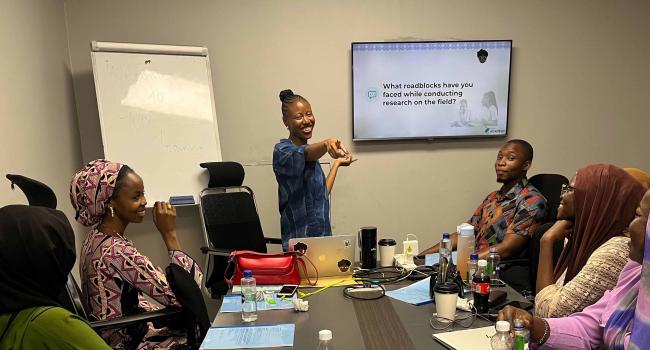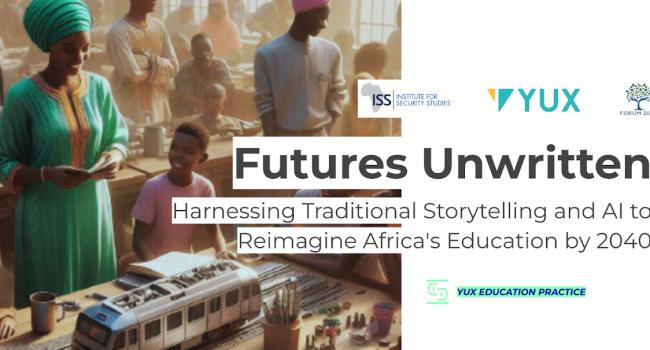
A few weeks ago, I had the incredible opportunity to attend the Transform Africa Summit in Victoria Falls, Zimbabwe, as a representative of YUX Design. Thanks to the generous sponsorship from the International Trade Center NTF5 Program, I found myself among global and regional leaders from various sectors, all gathered with a shared goal: to foster collaboration and explore innovative ways to accelerate Africa's ongoing digital revolution. In this article, I would like to share some of the valuable insights and key learnings I gained from this transformative event.
Side note: The conference took place in the picturesque Victoria Falls National Park, where the majestic falls themselves were just a stone's throw away from the venue. President Emmerson Mnangagwa of Zimbabwe aptly reminded us that the local and original name of the falls is "Mosi oa-Tunya," meaning "The Smoke That Thunders" in the Lozi language. Interestingly, "Victoria Falls," named after the British monarch Queen Victoria by the missionary David Livingstone, continues to be used to attract tourists from all corners of the globe, which is one of the reasons the name is still maintained. By highlighting this colonial legacy, the stage was set for thought-provoking discussions on Africa's ability to reclaim and drive its own digital revolution.
Now, let's dive into the main takeaways of the event.
Beyond Connectivity: Bridging the Digital Divide Requires a Strong Understanding of the Perceived Barriers to Adoption & Usage

Connecting the unconnected goes beyond mere connectivity. While coverage is essential, usage is equally critical. Affordability, low digital literacy levels, and relevant content in local languages are key factors that influence digital adoption. Bridging the digital divide in Africa necessitates addressing these challenges comprehensively, firstly by understanding the nuances and differences between countries and how communities perceive barriers related to affordability and skills based on their digital ecosystems. Achieving digital inclusion in Africa demands a comprehensive approach that acknowledges the nuanced differences between countries and understands how communities perceive barriers based on their unique digital ecosystems. For example, a GSMA study revealed that in Kenya, skills were less of a concern compared to that of other countries like Tunisia and Nigeria, likely due to a significant amount of the population’s experience navigating Mpesa and government services on 2G and 3G. Additionally, it is important to recognize that the digital divide is also gendered, with women facing specific challenges and disparities in accessing and utilizing digital technologies. By recognizing these complexities and tailoring interventions accordingly, we can effectively narrow the digital divide, empower communities, and promote inclusive digital growth across the continent.
“To be transformed you have to be informed” - Lacina Kone | Director General and Chief Executive Officer, Smart Africa.
Challenging the Colonial Legacy: Recognizing the Non-Neutrality of Technology
Technology, although often portrayed as a neutral force, is not devoid of biases and is deeply influenced by historical and systemic discrimination. For example, the dominant presence of English in the realm of technology inadvertently excludes those who are not proficient in the language. It is important to acknowledge and discuss the potential inherent biases that may arise during the development, deployment, and utilization of technology. This recognition highlights the significance of diverse perspectives, inclusive representation, and fair access to contribute to the creation of technology solutions in Africa. By embracing local languages, cultural references, and indigenous knowledge systems, technology has the potential to empower African communities, fostering a sense of identity and ownership.
Women's Financial Empowerment as a Catalyst for Change
Empowering women financially has the potential to create a transformative impact on poverty reduction and community well-being. Studies have consistently shown that when women are lifted out of poverty, they lift more people around them out of poverty than men, as they tend to invest a significant portion of their income in their families and communities. This multiplier effect can lead to improvements in child nutrition, education, healthcare, and overall household welfare. Empowering women economically is not only a matter of gender equality but also a powerful tool for sustainable development.
Disruption vs. Displacement: Collaborative Efforts to Create a Supportive Environment for Innovation
“There is a gap between what the startup intends to do and the policy maker is mandated to do. While the startup intends to disrupt, the policy maker sees it as displacement.” - From the case of the Nigerian start-up act
The power of collaboration between startups, international development organizations, and government agencies was a recurring theme at the summit. The development of startup acts in various countries, such as Tunisia, Nigeria, Rwanda, and Senegal, showcased the potential of involving stakeholders at all levels, challenging the notion that policy making is a top-down approach. To foster innovation and solve real problems, it is crucial to bridge the gap between startups' intentions and policymakers' perspectives through co-creation and dialogue.
Unintended Consequences: Balancing Policy and Ecosystem for Innovation and Entrepreneurship
It was evident that legal frameworks, although essential, often lack the agility required for rapid experimentation and growth. The question arose: how can we use words to afford the freedom necessary for innovation? One compelling idea was the establishment of sandboxes within each ministry, allowing for innovative projects that may not be explicitly permitted by existing laws. Another interesting idea that I loved, was the formation of an ‘unintended consequences’ team as part of Nigeria’s startup act, to be established to address situations that were not predicted, ensuring a proactive approach to unforeseen challenges. I think that all startups, organizations, and innovators should have a team like this when seeking to implement innovations!
Portable Digital Identities for Trade Facilitation
Digital identities emerged as a critical factor for driving digital transformation in Africa and reducing trade barriers. The concept of non-stop border posts, as mentioned by His Excellency Hakainde Hichilema, President of Zambia, emphasized the need for seamless movement of goods across borders. By implementing digital platforms and ensuring portable digital identities, we can streamline trade processes. For example, this would enable drivers to focus solely on reaching their destinations, rather than encountering unnecessary delays at each checkpoint. The integration of digital identities would also facilitate access to healthcare, education, and financial services by simplifying processes and increasing transparency. Overall, the widespread adoption of digital identities holds great potential for overcoming obstacles and propelling Africa towards a prosperous and inclusive digital future.
“The only time that a driver bringing goods should stop on the way to Zambia, other than the call of nature, is at his destination” - HE Hakainde Hichilema, President of Zambia
AI's Potential to Level the Playing Field
The summit also shed light on the immense potential of artificial intelligence (AI) in Africa, particularly in bridging productivity gaps and creating a more level playing field for local businesses. While the complete impact of AI on jobs and safety is still uncertain, Africa stands to benefit significantly from its adoption across many sectors: agriculture, finance, education, and health. An excellent example came from Rwanda, where the ratio of radiologists to the population is approximately 1 to 1 million. To address this challenge, the country has piloted the use of AI technology to detect tuberculosis (TB) from chest X-rays. Futures thinking and strategic foresight can play a crucial role in harnessing the potential of artificial intelligence (AI) in Africa by anticipating future trends, challenges, and opportunities. They can help guide policy and decision-making processes to ensure responsible and equitable AI implementation, fostering a future where AI technologies contribute to sustainable development and benefit all segments of African society.
The Transform Africa Summit was a catalyst for thought-provoking discussions and insights, shedding light on the transformative power of digital innovation in Africa. It reinforced the need for agile legal frameworks, portable digital identities, collaboration among stakeholders, bridging the digital divide, women's financial empowerment, and leveraging AI for sustainable growth. By championing user-centric design and actively involving users in the creation of digital solutions, YUX Design is excited to play a role in ensuring that the digital future of Africa is inclusive, representative, and responsive to the needs of its people.



